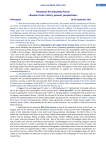Статьи журнала - Arctic and North
Все статьи: 972
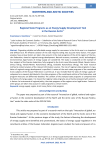
Regional State Programs as an Energy Supply Development Tool in the Russian Arctic
Статья научная
Organizing reliable and affordable energy supply for consumers in the Arctic area is an important and difficult task. An effective solution of this task requires taking into account many factors. This paper analyzes how various factors are taken into account in the state programs of the Arctic regions of the Russian Federation, aimed at regional energy development. Natural resource, economic, social, technological, environmental, legal factors of energy supply are considered. The study is conducted on the example of four subjects of the Russian Federation, fully assigned to the Arctic zone (Murmansk Oblast, Nenets Autonomous Okrug, Yamalo-Nenets Autonomous Okrug, Chukotka Autonomous Okrug). The main research method is content analysis of the relevant information sources. The role of regional state programs in regulation of regional energy development is specified. A review of the main state programs of the considered Arctic subjects of the Russian Federation is carried out. It was revealed that the tasks of energy supply development are unevenly distributed in the state programs of the constituent entities of the Federation, and program measures are differently detailed. The content of the analyzed state programs is compared with the factors of energy supply. It is shown that regional state programs are primarily compared with economic factors. As instruments of regional policy, the state programs of the regions act as legal factors. Factors of other groups are taken into account in state programs to a lesser extent.
Бесплатно
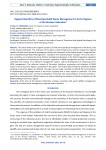
Regional specifics of municipal solid waste management in Arctic regions of the Russian Federation
Статья научная
The article analyzes the regional specifics of solid municipal waste management in the Arctic zone of the Russian Federation. The relevance of the topic is determined by the need to analyze the regional specifics of solid municipal waste management within the framework of the federal project "Integrated System of Solid Municipal Waste Management", included in the national project "Ecology". First of all, this request will allow us to achieve the most effective management decisions in the field of regulatory regulation and the introduction of mechanisms for economic regulation of MSW management activities, as well as to contribute the creation of an effective management system, and the development of infrastructure for MSW management. The statistical analysis of formation indicators, processing and utilization of MSW waste in the structure by region is presented in this paper. The factors determining the specificity of MSW handling in the Arctic regions are defined. The expert survey made it possible to identify the main problems of implementing the garbage reform in the Arctic in general and in inner regions in particular. The main methods in this study were: semi-formal telephone interviews with representatives of environmental organizations and associations (18 informants), as well as collecting and analysis of statistical indicators of the MSW handling in the Arctic regions.
Бесплатно
Reindeer Tracking Technologies in the Russian Federation
Статья научная
Currently, reindeer husbandry actively uses tracking technologies to identify animals. They allow solving the problems of breeding and zootechnical accounting, tracking the movement of animals between herds, and carrying out antiepizootic measures. The electronic databases with individual characteristics of reindeer formed in this process allow speeding up the breeding process, organising breeding work in reindeer breeding, improving the breed and regulating the herd. Keeping an electronic “registration” of calves to their mothers gives the possibility of system functioning of cross-breeding estimation of animals that will undoubtedly increase both productivity and economic efficiency of reindeer breeding as a whole. This article addresses an issue related to reindeer tracking technologies. Attention is paid to radio tracking and satellite tracking techniques. The use of modern methods of chipping animals is considered on the example of various territories of the Russian Federation: the Yamalo-Nenets Autonomous Okrug, the Republic of Sakha (Yakutia), the Trans-Baikal Krai, the Murmansk Oblast, the Krasnoyarsk Krai, the Republic of Karelia, the Arkhangelsk Oblast. The work carried out on deer chipping is considered for various time periods, during which monitoring, programs, projects and other large-scale studies of animal movement paths were carried out. The resulting data can then be processed using mathematical tools, after which conclusions can be drawn about the impact of the environment on reindeer migration routes.
Бесплатно
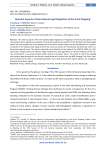
Relevant aspects of international legal regulation of the Arctic shipping
Статья научная
The critical aspects of the international legal regulation of shipping in the Arctic discussed on the international Arctic agenda are analyzed. The authors examine the specifics of the Northern Sea Route legal status from the perspective of the leading role of the Arctic coastal states and the possibilities for countries to specify at the national and regional levels the universal norms of international maritime law at the national and regional levels. The authors devoted much attention to the study of the UNCLOS 1982, Art. 234, which gives coastal states the right to adopt national laws and regulations to control pollution of the marine environment in ice-covered areas within exclusive economic zones. The article is one of the leading international legal grounds for the Russia's establishment of control over the NSR shipping. The Polar Code, entered into force in 2017, is examined separately. The article also presents expert opinions on navigation forecasts in the Arctic region.
Бесплатно
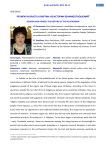
Religion and power in Yakutia: From the history of relations
Статья научная
The article contains analysis of the Soviet regime policy in its attitude to religion during first years of the Soviet modernization.
Бесплатно
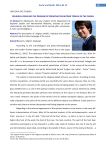
Religious views and the problem of preservation mother tongue of the evenks
Статья научная
The description of religious beliefs, indicated the problem of preserving the native language of the evens.
Бесплатно
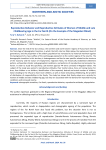
Статья научная
Since the end of the last century, the northern and north-eastern regions of Russia have entered the final stage of demographic transition, in which the birth rate has fallen below the replacement level of generations, and the proportion of the elderly population has increased to its historical maximum against the background of a mass outflow of the working-age population to the central regions of the country. The demographic transition in this territory is heterogeneous and has its own specifics related to the structure of the economy and the nature of employment, migration flows, the historically established settlement pattern, unfavorable climatic and geographical conditions, and patterns of reproductive and consumer behavior. In order to study this specificity, 226 women aged 25-44 were surveyed in Magadan Oblast. The subject of the study was women’s reproductive attitudes, their marital status, focus on having many children, few children or no children, identification of the expected, desired and actual number of children, factors leading to the refusal to have more children, as well as those stimulating childbearing, the problem of distribution of responsibilities in the family. The study has shown that family values are a priority for women of middle and late childbearing age, but they are associated with the demand for improved housing conditions and increased income.
Бесплатно
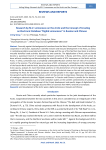
Статья научная
Currently, against the background of sanctions from the West, Russia and China should strengthen cooperation in all sectors, especially in scientific research and resource development in the Arctic, as well as in combating problems associated with climate change and the use of the Northern Sea Route to enhance mutually beneficial trade activities between the two countries. The digitalization of Arctic culture should become a paramount branch of cooperation between universities in Russia and China, which cannot be done without considering and disseminating the scientific works of M.V. Lomonosov on the North and the Arctic. In China, Lomonosov was a completely understudied Russian scientist from all sides of his achievements in the sciences. The article gives an overview of M.V. Lomonosov’s contributions to the development of the Russian North and the Arctic, describes the processes of shaping his scientific interests in the study of Arctic spaces, analyzes his main theoretical positions on the phenomenon of Arctic lights and the natural conditions for the development of Arctic spaces, reveals his historical views on the role and importance of mastering the Arctic for the language possession of small peoples in this region against the background of the spread of world civilization and culture, which still has not lost its importance. Moreover, the relevance of creating an electronic database “Digital Lomonosov” in Russian and Chinese in parallel for the development of modern Lomonosov’s science and translation studies on the scientific achievements of Lomonosov in China is considered, the main concept of the Project development and specific stages of digitalization of Lomonosov’s works in two languages by joint efforts of scientists from NArFU and CHU are analyzed.
Бесплатно
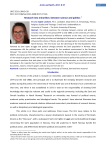
Research into minorities: between science and politics
Статья научная
The article examines the interplay between science and politics in minority research in the period 1979 to mid-1980s at the University of Tromsø. Research was influenced by different conditions at the time, such as political events and policy priorities and ideological of streams in academia. Three factors influenced the choice of theme, priorities and approaches to minority research in North Norway. The first factor was the damming of the Alta-Kautokeino river, followed by Sami rights struggle and political changes towards the Sami population in Norway. What consequences did the political case for the research for the academic environment in the Northern Norway? The second factor was the research program run by the Norwegian general scientific Research (NAVF). An analysis on the relevant themes and focus areas within minority research is undertaken on basis of the research program. Finally I will use the methodological and research political discussions on emic and etic research positions that took place in the 1980s. Was it the Sami themselves, or also the researchers belonging to the majority that had the right to pursue research on the Sami? Sources consist of internal documents, reports, research papers and oral sources from the UiT.
Бесплатно
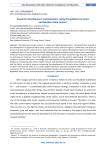
Research, development, and education: laying foundations for Arctic and Northern data centers
Статья научная
The global data center industry is a huge and rapidly growing sector. This growth has resulted in the development of significant data center clusters in various northern regions. Furthermore, the desire to attract new data center investments has been incorporated into regional development plans and strategies in different parts of the Circumpolar North. Although the policy-makers seem to have great expectations, they and the general public often know little about the industry, which consumes huge amounts of electricity and plays an immense role in the digitalization process that the world is experiencing. This article attempts to increase awareness, knowledge, and understanding of these matters among all relevant stakeholders by introducing data center-related research and development activities and education in the Arctic and the North, as well as research concerning the development of the data center industry in the cold, northern environment. After all, it is often argued that these particular conditions offer advantageous circumstances for the construction of environmentally friendly and sustainable data centers.
Бесплатно
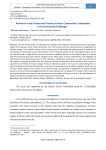
Resilience in the Theory and Practice of Arctic Communities’ Adaptation to Environmental Challenges
Статья научная
The aim of this study is to describe the individual and collective characteristics of the rural population of the Russian Arctic, which determine their vital activity and are internal factors of adaptation to climate change. The scientific novelty of the study consists in describing the phenomenon of resilience on the example of island and coastal communities of the Primorskiy district of the Arkhangelsk Oblast, which are characterized by high natural and socio-economic instability. Based on the empirical data, it is shown that the territorial and socio-cultural integrity of the living space of local communities, the integrality of self-existence and self-consciousness of local residents, cooperative coexistence, as well as proactivity of life support create the foundation for the resilience of local communities and contribute to their social adaptation to the effects of climate change. Particular attention is paid to the issue of understanding the culture of mobility of northern communities in the face of increasing cases of adverse weather events due to climate change. Based on the results of an empirical study, an approach to adaptation to climate change based on the use of the knowledge potential of local communities is proposed. The results of the study can be used to develop the theory of the development of the North of Russia, as well as the development of specific measures for adaptation to climate change at the local level.
Бесплатно
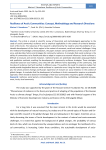
Resilience of Arctic Communities: Concept, Methodology and Research Directions
Статья научная
This article is aimed at scientific review of theoretical and methodological approaches to the study of social (community) resilience and its empirical applicability in the context of territorial development of the Arctic. The relevance of this research is determined by the need to solve the problems of sustainable development of the Arctic region in the context of economic, social and natural challenges. Using the method of knowledge contextualization, the paper analyses various definitions of the concept of resilience, and describes factors and strategies for community resilience. It concludes that social resilience is the ability of communities to be flexible and able to adapt in response to external influences. Social resilience is difficult to measure and control; however, resilience factors are potentially observable using quantitative and qualitative methods, enabling the development of community resilience strategies. These strategies should be based on local realities, since they will take different forms depending on the community, and the idea of resilience itself will manifest in different ways. This justifies the need for empirical studies that would provide longitudinal data on social resilience in a particular area. Using the Arctic region as an example, the article presents foreign and Russian experience of research on social resilience in the context of global changes. It concludes that the development of resilience in Arctic communities requires a systematic approach, which should be based on knowledge of how local communities respond to global challenges.
Бесплатно
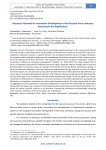
Статья научная
The aim of the work is to determine a scientifically based assessment of the resource potential of the Arctic industry, which determines the possibility of transition the economy to an innovation type of development, taking into account its specific features. The considered scientific works of foreign and domestic scientists made it possible to determine the methodology for rational assessment of the resource potential of the industry of the Arctic territories. The study was performed on the basis of production, technical, investment, staffing and innovation development indicators for 2013–2019. The study showed that in terms of production and technical indicators the Arctic regions generally have an average level of resource potential while the maximum values are typical for the Nenets and Yamalo-Nenets Autonomous Okrugs. In terms of investment indicators, the Arctic regions are characterized by high potential. In terms of staffing, the Arctic regions are characterized by low potential while Murmansk Oblast demonstrated effective personnel policy. Innovation development indicators of the Nenets Autonomous Okrug and the Murmansk Oblast are lower than in the Chukotka and Yamalo-Nenets Autonomous Okrugs. The Arctic regions are characterized by the differentiation of indicators of resource provision of economic development associated with differences in production, investment, personnel and innovation spheres. The study showed that the highest aggregate resource potential for innovation development is typical for the Yamalo-Nenets Autonomous Okrug while the lowest one is typical for the Chukotka Autonomous Okrug and the Murmansk Oblast. Proposals for further scientific research in the direction of enhancing innovation and accordingly increasing socio-economic indicators of the Arctic regions were developed.
Бесплатно
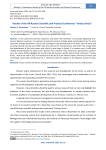
Results of the All-Russian Scientific and Practical Conference “Yenisey Arctic”
Статья научная
In the context of economic turbulence and within the framework of constantly tightening sanctions by Western countries, it is necessary to take into account strategic goals and emerging risks. The most important strategic documents, such as the "Strategy for the development of the Arctic zone of Russia and ensuring national security up to 2035” take into account the macroeconomic and other risks arising while the development of the Arctic water area, which is quite large in Russia. If its western part is sufficiently studied and developed, the eastern part requires more attention from researchers, government and business. The review briefly highlights the results of the All-Russian scientific and practical conference “Yenisey Arctic”, held at the end of 2022 in Krasnoyarsk on the basis of the Siberian State University of Science and Technology named after Academician M. F. Reshetnev with the support of the Regional Science Foundation.
Бесплатно
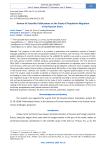
Review of Scientific Publications on the Study of Population Migration in the Russian A
Статья научная
The purpose of the article is to conduct a quantitative and qualitative analysis of Russian-language publications on the topic of population migration in the Arctic zone of Russia. The national bibliographic database of scientific citation hosted on the eLIBRARY.RU platform was used as a source of information. The research methodology is based on the use of structural-semantic analysis of texts in combination with general scientific methods (analysis, generalization and systematization). The time period of 2010-2022 is characterized by an increase in the number of publications on migration issues in the Arctic zone of Russia, which was most clearly manifested during the adoption of Russia’s Arctic strategies. During the period under review, Russian authors prepared about 300 articles on the study of population migration in the Russian Arctic. However, the number of researchers who regularly publish papers on this topic is small. The analysis made it possible to identify an objective list of authors groups (scientific schools) that are leading in terms of the number of publications in this subject area. The main directions of the population migrations study in the Russian Arctic zone are considered according to six key scientific schools, general and special approaches of the authors to the study of Arctic migrations are highlighted. The study results will be useful and interesting to scientists, whose research area is related to population migration, including in the Russiaт Arctic regions; specialists dealing with social issues of the development of the Arctic territories; postgraduates and students involved in this field.
Бесплатно
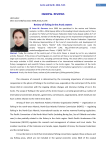
Review of fishing in the Arctic waters
Статья научная
Today the enclave of the central part of the Arctic Ocean is closed by ice for any industrial activity. However, if the process of warming goes on, countries will have a real prospect for development of large-scale economic activities in the area, including commercial fishing. The article offers cross-section of the major activities in 2015 aimed at the establishment of an international multilateral convention on fishery management and scientific fishery research in the Arctic region. The cooperation of the Arctic Council countries in the field of fisheries in the framework of international agreements is considered, as well as the species composition of fish of the Arctic seas is given.
Бесплатно
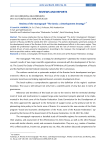
Review of the monograph “The Arctic: a Development Strategy”
Статья научная
The review emphasizes the key features of the monograph “The Arctic: Development Strategy”, prepared by experts of the Council for the Study of Productive Forces of the Ministry of Economic Development of Russia and NArFU named after M.V. Lomonosov. The authors developed a systematic analysis of the development issues of the Russian Arctic and the state development efforts in this macro-region. They studied the preferential regimes of economic activities and the role of mineral resource centers as important drivers of socio-economic development. According to the reviewer, the monograph is of interest both to specialists and to a wide range of readers.
Бесплатно
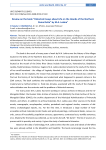
Статья научная
The book is the result of a great work of M. A. Lukina on the history of villages in the Delta of the Northern Dvina River. The book is the first study of the island colonization, establishment, and centuries-old development of settlements in the mouth of the Northern Dvina River. The author combined the traditional historical approach to the data presentation and the method associated with the study of the value change over the centuries and historical memory.
Бесплатно
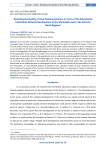
Статья научная
A lot has been said about the low quality of territory development programs at the regional and municipal levels in Russian literature. However, rare examples are given to confirm this thesis. In the case of such closely related issues as demographic and the education system development at the municipal level, we consider the territorial planning schemes and show these issues are not given sufficient attention. In terms of demography, the main disadvantages are an insufficiently detailed analysis of the age distribution of the population and its dynamics, analysis of a very short period (1-4 years), underestimation of existing trends (e.g., a wave-like change in the population), and an extremely weak demographic forecast. Concerning the education system, the main disadvantages are a short review horizon (1-3 years), insufficient analysis of trends and justification of the proposed measures, the use of planned rather than real indicators, which leads to an underestimation of demographic trends, insufficient analysis of the accessibility of educational organizations. A more detailed analysis of indicators over a greater number of years should be carried out to improve the quality of the schemes. When developing them, it is necessary to involve a specialist in demographic forecasting. Finally, it is required to create a model scheme that can be guided by developing schemes at the municipal level.
Бесплатно

